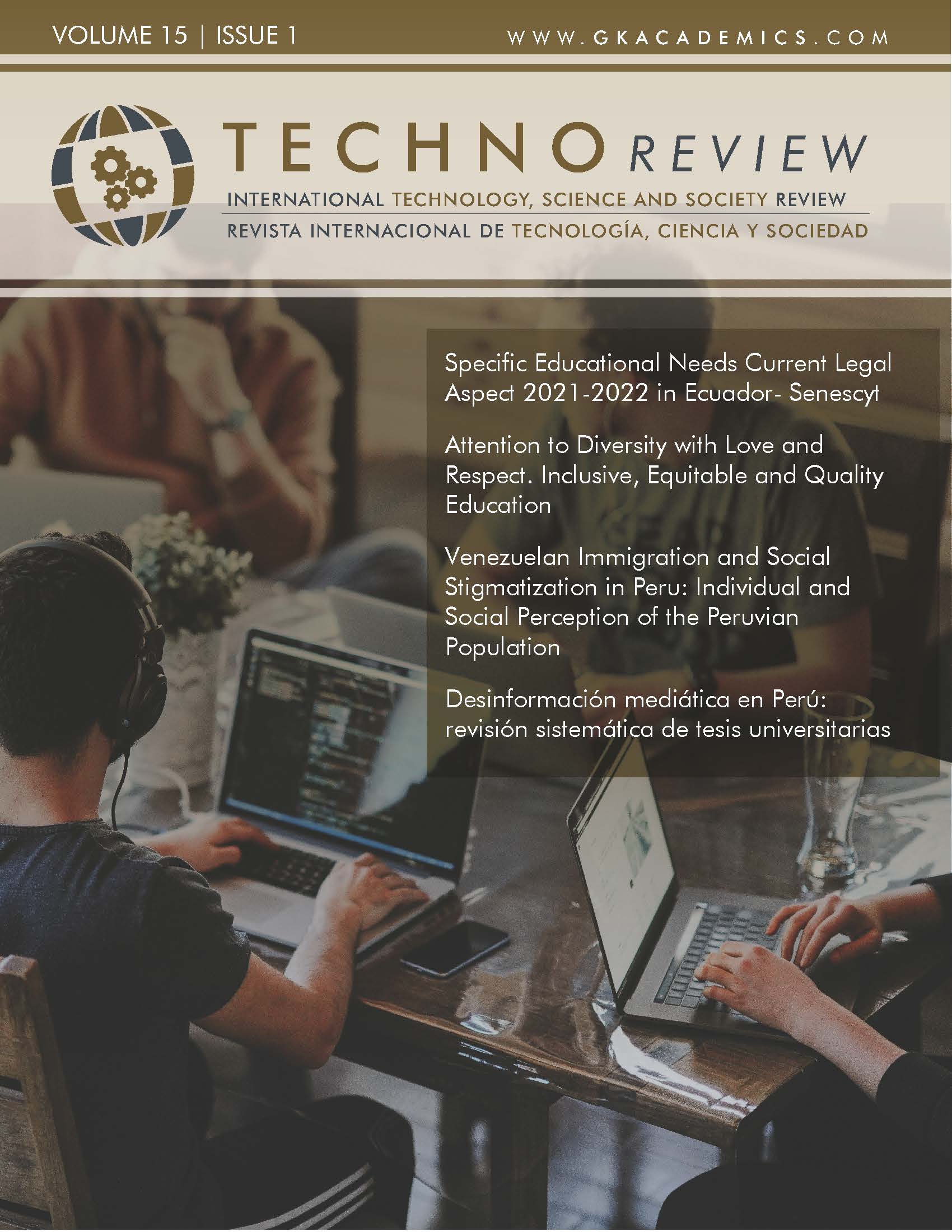Attention to Diversity with Love and Respect. Inclusive, Equitable and Quality Education
DOI:
https://doi.org/10.37467/revtechno.v15.5033Palabras clave:
Diversity, Love, Respect, Inclusion, Equity and quality, EducationResumen
Educational inclusion, equity and quality of education should be considered from the perspective of diversity, love and respect for students. The teacher is the architect of this variable education, which is why this research was conducted. The main objective is to understand the degree of relationship between the dimensions of inclusive, equitable and quality education. A quantitative correlational study was carried out under a non-experimental design, in which the perception of 384 teachers in the province of Guayas, all of them in initial and basic education, was collected through a survey. Cronbach's alpha was 92.5%.
Citas
Arohuanca, J. W. H., & Choque, F. A. C. (2019). Puno: Rural education and critical thinking. Towards an inclusive education. HELIOS, 3(1), Art. 1. https://doi.org/10.22497/helios.v3i1.1105.
BBC. (2020). Which 5 countries in the world have inclusive education laws (and two are in Latin America). BBC News World. https://www.bbc.com/mundo/noticias-53146030
Casanova, M. A., & Rodríguez, H. J. (2009). Educational inclusion, a horizon of possibilities. Editorial La Muralla.
Castro, R. (2017). Documentary Review and Analysis for State of the Art: Social Imaginaries on Educational Inclusion. Latin American Journal of Inclusive Education, 11(1), 283-297.
Cuevas, C. A., López F, M. del C., Valenzuela, M. J. I., Cares, J. E., & Quintanilla, T. A. (2019). Application experience of a language stimulation program conducted in inclusive kindergarten classrooms. Journal of Speech Therapy, Phoniatrics and Audiology, 39(3), 129-140. https://doi.org/10.1016/j.rlfa.2019.04.002.
Donoso, D. (2013). Inclusive education in the legal framework of ecuador: do ecuadorian laws respond to the needs of the inclusive model? https://eprints.ucm.es/id/eprint/29383/1/Diana%20Donoso%20Figueiredo%20(TFM)%20-%20-%20Master%20Educacion%20Social%202012-2013.pdf.
Echeverría, O., Posso, M., Galárraga, A., Gordón, J., & Acosta, N. (2017). Inclusive curricular adaptation in regular education. ECOS DE LA ACADEMIA, 3(05), Art. 05.
Gil, C. G. (2018). Sustainable Development Goals (SDGs): A critical review. https://www.fuhem.es/media/cdv/file/biblioteca/revista_papeles/140/ODS-revision-critica-C.Gomez.pdf
González, A. O. (2018). Interview with Dr. Roberto Follari on Critical Thinking and Latin American Epistemology. Polyphōnía. Journal of Inclusive Education, 2(2), 231-238.
Klimentyeva, V., Klimentyev, D., Pashneva, S., Umerenkova, A., & Fedorova, D. (2021). Impact of inclusive education on improving the quality of life of totally blind students. SHS Web of Conferences, 98, 02013. https://doi.org/10.1051/shsconf/20219802013. https://doi.org/10.1051/shsconf/20219802013
Molina, M. (2020). The reality of inclusive education in Ecuador. http://www.revistarupturas.com/la-realidad-de-la-educacion-inclusiva-en-el-ecuador.html
Nilsen, S. (2020). Inside but still on the outside? Teachers' experiences with the inclusion of pupils with special educational needs in general educationInside but still on the outside? Teachers' experiences with the inclusion of pupils with special educational needs in general education. International Journal of Inclusive Education, 24(9), Art. 9. https://doi.org/10.1080/13603116.2018.1503348
Sulasmi, E., & Akrim, A. (2020). Construction of Inclusive Education Management in Primary Education. Kumpulan Makalah, Jurnal Dosen, 0(0), Art. 0. http://publikasiilmiah.umsu.ac.id/index.php/kumpulanmakalah/article/view/1018
Descargas
Publicado
Cómo citar
Número
Sección
Licencia
Aquellos autores/as que publiquen en esta revista, aceptan los términos siguientes:
- Los autores/as conservarán los derechos morales sobre la obra y cederán a la revista los derechos comerciales.
- Transcurrido un año desde su publicación, la versión del editor pasará a estar en acceso abierto en la web de la editorial, pero la revista mantendrá el copyright de la obra.
- En el caso de que los autores deseen asignar una licencia abierta Creative Commons (CC), podrán solicitarla escribiendo a publishing@eagora.org







